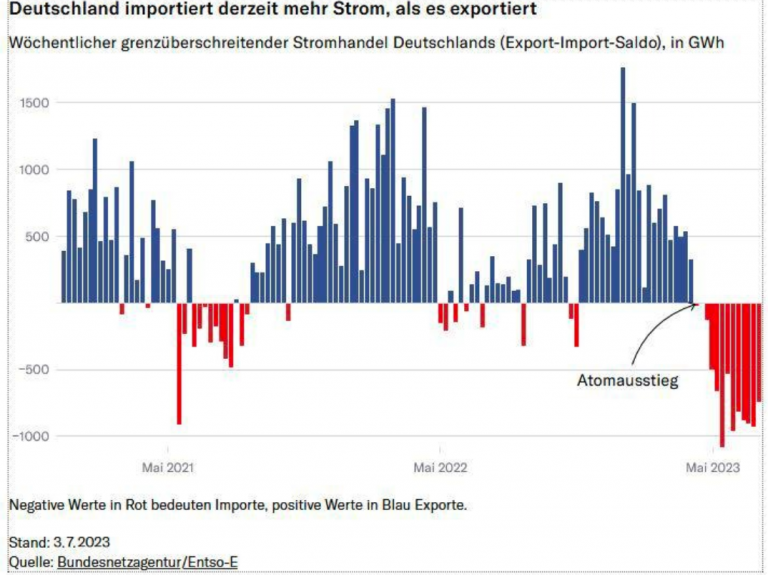Germany has gone from being an electricity exporter to being an importer.
Germany’s powerful environmental movement not only vilified fossil fuels, but also nuclear power. So much so, in fact, that Germany has shut down its entire fleet of nuclear power plants over the recent years.
Moreover, Germany plans to exit all fossil fuel power generation by 2038.
So where can Germany get its power from? The government doesn’t have a plan for that. Coalition partner The Greens claim that it is no problem to get it cheaply from wind and sun. But that’s a lie.
Already since Germany shut down its last three remaining nuclear power plants, the country has had to turn to its neighbors to keep the lights on. Germany has gone from being an exporter of electricity to an importer.
Blue indicates export. Red shows import. Source: Bundesnetzagentur (Federal Grid Agency).
The above chart shows Germany’s net exports and imports of electricity in gigawatt-hours since early 2021. Over the past 3 years, Germany has had to import power every May-June. But since Germany shut down its last nuclear power plants (Atomausstieg) in April this year, imports of electric power have grown like never before.
Power generation isn’t the only thing that’s getting imported. Due to the country’s record high electricity and energy prices brought on by the transition to green energies (Energiewende), German companies are leaving or planning to leave the country in droves. The environment has become too hostile to do business.
Companies plan to relocate
Euractiv here reports “16% of the medium-sized companies have already initiated steps to relocate parts of their business” and that “another 30% are considering following suit.”
“Almost two-thirds of the companies we interviewed consider prices of energy and resources to be among the most pressing challenges,” said German Association of Industry President Siegfried Russwurm, citing a recent survey of businesses.
“Electricity prices for businesses have to fall reliably and permanently to a competitive level, otherwise the [green] transformation of businesses will fail,” he said, adding that it was the “the responsibility of politicians to improve the conditions for businesses in Germany.”
In response surging energy prices, electric car giant Tesla scrapped some of its ambitious plans to build its biggest factory for batteries near Berlin and announced in February that it would focus on the US market instead.
Currently Germany’s economic growth is in recession, “with high energy costs and the EU’s carbon prices repeatedly cited as reasons for undermining the country as a location to do business.”
“We’re already observing that investment into energy-intensive industries has fallen significantly in Germany,” Clemens Fuest, the president of the Ifo Institute.






Long term implications are startling.
[…] From the NoTricksZone […]